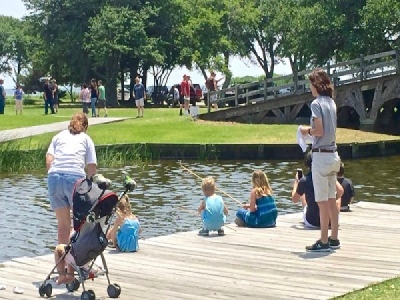
Posted on November 1, 2016
By Dee Langston, The Outer Banks Voice
When it comes to the question of dredging a channel in the Currituck Sound to connect it to the boat basin at Currituck’s Heritage Park in Corolla, which includes the historic Whalehead Club, Currituck County officials are still not willing to take no for an answer.
The county has sought permits to dredge the channel and deepen the boat basin numerous times over the past 20 years, and voted to do so again at the October Board of Commissioners meeting.
What’s changed? Attitudes in Raleigh, County Manager Dan Scanlon told the board during its Monday, Oct. 3 meeting.
“What we’re hearing is that the current leadership in the state of North Carolina has been looking at the degree of regulatory oversight and the impacts it has on economic development and building in the last year,” Scanlon said.
Earlier this year, commissioners asked Scanlon to look into reviving the issue.
“We have an application we’ve put some degree of effort in,” Scanlon told the board. “Hopefully it will receive an easier path and a more receptive path.”
The county sought permits to connect the sound to a deepened boat basin in 1996, 1998, 2000, 2004 and 2011. Each time, the request was denied by state and federal entities, including NOAA, the U.S. Army Corps of Engineers, the North Carolina Division of Coastal Management, the Department of Environment and Natural Resources, the U.S. Fish and Wildlife Service and the Division of Marine Fisheries.
The county’s 2011 application — which sought permission to maintain a channel that was open at least until the 1970s, rather than dredge a new one — received the most negative reception.
Although that application expanded on the purpose and need for the dredging, including improving emergency response times, adding an additional route between the Outer Banks and the mainland and providing another educational element to the Outer Banks Center for Wildlife Education at Heritage Park, the agencies weren’t swayed.
County officials traveled to Washington, N.C. for a preliminary meeting on the application, and met with representatives of all of the agencies involved, Scanlon told the board. Commissioner Vance Aydlett said he attended as well.
“As you can imagine, you have all these agencies that are in the room, and they start telling us all the things they’ve told us over the years, but they’re not as kind,” Scanlon said.
“ ‘We’ve told you ‘no’ three or four times, and you’re back again — what’s changed? What is different?’ ” county officials were asked, Scanlon said. “They did literally tell us, ‘Hell no, we’re not going to give you a permit.’ ”
However, the current state legislature has simplified some of the steps involved in the environmental approval process, to make it less “onerous,” Scanlon said.
“A big part of that is that it doesn’t have to get commented on by all of the various agencies that have been historically against the project,” he added. “For example, essential fish habitat is no longer the kiss of death.”
One of the environmental challenges that the dredging project has been unable to overcome is the potential damage to underwater vegetation, which provides fish with essential food and a place for breeding.
However, Scanlon said there have been successful mitigation projects — meaning the replanting of underwater vegetation — to restore the disturbed habitat. He also showed commissioners an undated photo of the sound following a nor’easter.
The picture, which was included in the 2011 application, shows the old channel and the apparent sandy bottom of the sound, which may suggest a lack of underwater vegetation.
In addition to limiting the number of agencies involved in permitting, another change in state government may also make the approval process easier, Scanlon said.
“They completely did away with DENR — the Department of Environment and Natural Resources,” Scanlon said. “They’ve created a new department called the Department of Environmental Quality.”
Scanlon also told commissioners that he had been contacted by a consultant who was aware of the county’s efforts, and suggested that now might be the time to submit another application.
“The indication is that perhaps things are changing and we could have a better chance if we went back,” Scanlon said.
Commissioner Mike Hall made the motion to move forward with the application, and Chairman David Griggs asked that the motion be amended to include contacting the consultant Scanlon mentioned.
The motion passed unanimously.
Source: The Outer Banks Voice





